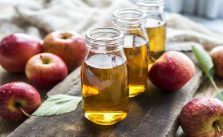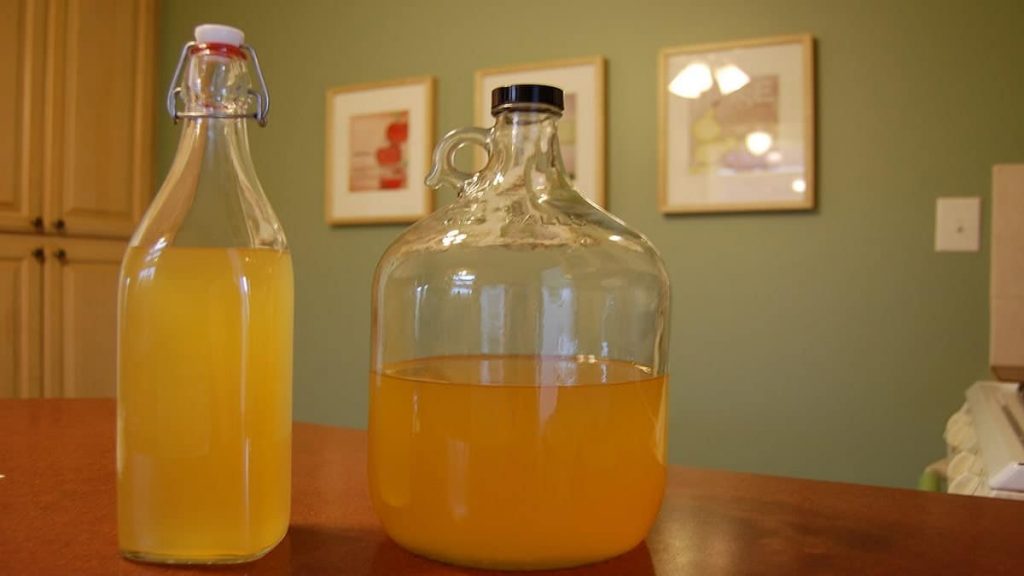The foundation of a delicious glass of cider is the right fruit juice and yeast. “What, you don’t have an apple orchid!” Well, there goes the plan of making cider at home… just kidding. You have to be quite selective with the apples you choose because they yield a cider that you won’t ever forget.
You don’t know what you are missing. If your go-to drink is a raw orchard cider, fresh from a farmer’s market, then you won’t know the true taste of what cider tastes like. This one has no preservatives or pasteurization. Kinda tasty… and sorta sketchy. On the other hand, a pasteurized orchard cider is most people’s top pick. It has the best flavor and none of those E. coli bacteria. Lastly, the pasteurized cider from your grocery store, which has no preservatives, is not very flavorful. It just helps you pass time.
So, what gives these ciders their “tasty” position?
Yeast… wild yeast to be exact because we are making hard cider!
In a Hurry? Here are Our Top Choices
The Role of Yeast in Cider Making
You are probably thinking why not let nature take its course, right? There’s plenty of wild yeast floating in the air and some of it is bound to enter your juice and do the deed. Well, this kind of brewing will get you a drink somewhere between ― this is a little too “yeast” for my taste or it’s a bit bitter.
Yeast is that key ingredient that adds alcohol to your brew through the process of fermentation. The reason most cider mills rely on wild yeast to finish the fermentation process is because the yeast in their facilities is adapted to working in such an environment. This yeast is known as “brewer’s yeast” and does wonders for cider. However, for normal folks like us, packaged yeast is the best option. It’s inexpensive, lasts for years in the fridge and one packet can help you yield 5 gallons of cider.
The 5 Best Yeasts for Hard Cider Brewing
Now that you know about the super power of this ingredient, let’s take a look at some of the best yeast for hard cider brewing:
1. Safale S-04 Dry Yeast
When it comes to buying yeast, you need to be very careful with the type you are buying. Safale S-04 by Fermentis is known as English ale yeast but works perfectly well for ciders too. Its fast fermentation properties help deliver compact sediment, which improves the clarity of the cider.

Safale S-04 is one of the most common yeasts in the brewing community. The brand’s website says that this is authentic ale yeast and delivers 18% alcohol. We highly recommend this yeast for beginners. It offers a temperature range of 64° F – 72° F. While this is dry yeast, it doesn’t offer too dry a flavor like the wine yeast delivers. This allows you to preserve the apple flavor and make true hard apple cider. A packet of 11.5 grams of yeast costs around $4.
Pros
- It offers high alcohol content
- It doesn’t give a dry finish, which locks in the apple flavor
- It is great for carbonating cider in the end process
Cons
- If too much sugar is added to the fermentation process, this yeast delivers apple wine instead of cider
2. Côte des Blancs Yeast
This yeast by Red Star is specifically made for pear and apple ciders. It’s known for enhancing the flavor of the cider but at a slow rate. It offers a final gravity finish at around 0.997 to 1.000. The taste that comes out is a bit dryer compared to other yeasts but it does the job.
If you are a pro at making cider then this is the yeast for you. However, keep in mind that depending on the temperature you maintain in your DIY cider facility, AKA your kitchen, this yeast will deliver two results ― over aggressive yeast that ruins the flavor of your cider and the perfect yeast delivering the best cider. Côte des Blancs ferments at 65° F and offers an alcohol tolerance of 14%. A packet of 5 grams of this yeast costs less than $2.
Pros
- It is an excellent choice for making fruit ciders due to its cooler temperature
- It reduces sugar, which brings out the flavor of the cider
- Its low temperature produces less foam
Cons
- It has a slow fermentation temperature, which takes longer to make the cider
- If added too much then it might produce very dry cider
3. Nottingham Ale Yeast
This yeast by Lallemand can help you ferment just about any type of cider… even the difficult ones. Nottingham Ale yeast offers a long range of fermentation temperatures from 10° C to 30° C. It has excellent settlement strength and yields around 1% alcohol for 16. 3 g/L sugar.
This versatile yeast is great for ciders, as well as beers. Its neutral characteristics help preserve the flavor and convert almost all of the sugar to alcohol. Last but not the least, it is highly flocculent. Meaning: it offers a high drop of sediment for better cider clarity.
Nottingham Ale yeast ferments at 57° F and goes as high as 70° F. An 11-gram packet of this yeast yields 15 gallons of cider. You can get this yeast for around $8.
Pros
- It filters sediment quite well and offers better tasting cider
- Does not add a yeasty aftertaste to the cider
- Offers a slow fermentation process but not that slow, which might result in too hard a cider
Cons
- It is extremely expensive
- Faulty packaging, which causes the yeast to die
4. Lalvin 71B-1122 (71B)
This yeast by Lalvin delivers a smoother drink that enhances the fruit’s flavor in your cider. It offers a fermentation range of 59° F – 86° F, which is higher than other yeasts. Its alcohol tolerance level is 14%, which is perfect for making wines and ciders.
One of the best qualities of this yeast is that it consumes up to 40% of the cider’s malic acid. This can go two ways: if you are using apple juice, which is low in acids, then the taste might suffer. However, if you use fresh apples and handle the brewing process from scratch, this yeast will help you neutralize the cider’s acidity. A packet of 5 grams of this yeast costs around $5.
Pros
- Rapid fermentation started
- Metabolizes high amounts of malic acid
- Does not extract much of the phenols, which decreases the maturation time
Cons
- Mead on the yeast captures all kinds of flavors, which destroys the cider’s taste
5. Cider House Select Premium Cider Yeast
This yeast by Brand Brew Ohio has a little bit of yeast nutrient mixed in it. It offers a fermentation range of 54° F – 82° F. However, Brand Brew Ohio recommends that you keep the range between 61° F – 75° F, which can cause difficulty.
This yeast can be used dry or wet, and can be added directly to the brew. The best thing about Cider House Select Premium Cider Yeast is that it offers a high strain of ester, which produces a great flavor. The yeast ferments quickly and the end result is the perfect dry finish. A packet of 5 grams of this yeast costs around $3.50.
Pros
- It offers the right amount of alcohol tolerance between 4% and 7%
- Is also available in a gluten-free version
- Contains a trace amount of nutrition, which delivers better cider quality
Cons
- Varying fermenting temperature, which makes it difficult to maintain taste and cider clarity
Our Final Thoughts
As mentioned earlier, each cider type has different levels of wild yeast. This is why you need to be extra careful when adding yeast during the fermentation process. A little less and you will get a simple apple drink and a little more and you will have vinegar on your hands.
Your pick amongst these yeasts should be based on how high of an alcohol content you are looking for and your expertise in cider brewing.

